Dec 7, 2023
Pronouns
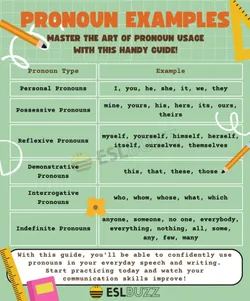
Pronoun Antecedent Agreement
A pronoun is a word that takes the place of a noun.
The word that a pronoun takes the place of is called the antecedent. The pronoun must agree with its antecedent in number:
a singular pronoun must replace a singular noun, and a plural pronoun must replace a plural noun.
For example: The plant needs a lot of sunlight, so I placed it by the window. The pronoun “it” takes the place of the singular “the plant.”
The plants need a lot of sunlight, so I placed them by the window. The pronoun "them" takes the place of the plural "the plants." DIRECTIONS: In each sentence, underline the pronoun. Then identify its antecedent.
Write whether the pronoun and the antecedent are singular (S) or plural (P).
1. When the girls arrived, they were drenched from the rain.
2. The cake was delicious. It was chocolate. 3. I don't like candy. It doesn't appeal to me.
4. The dogs are friendly. They are always wagging their tails.
5. These glasses don't fit. They sit crookedly on my face.
6. We are out of milk. You didn't get it from the store.
7. These toys don't belong to me. They belong to Benito.
8. Toby is whining at the pantry door. He wants a treat.
Pronouns | Antecedents
A pronoun is a word that takes the place of a noun.
The word that a pronoun takes the place of is called the antecedent. The pronoun must agree with its antecedent in number:
a singular pronoun must replace a singular noun, and a plural pronoun must replace a plural noun.
Choose the correct pronoun to complete each sentence.
1. That racoon is cute when (she / they) is sleeping.
2. Those are great books. I have read all of (it / them).
3. I eat a lot of apples. (It / they) are very good for you.
4. That boy called me name. Who is (he / they)?
5. Paul and Frank arrived. Are (he / they) late?
6. Joe and Rachel aren't here. Didn't you invite (him / them)?
7. Kim is my best friend. I really get along with (her / them).
8. The dog is whining. What does (he / they) want?
9. I lost my coat. I can't remember where I last had (it / them).
10. The dog wants a treat, but we are out of (him / them).
DIRECTIONS: Complete each sentence with a pronoun that agrees with its antecedent.
1. Will you watch your brother? _______ is in the pool.
2. Did you see those movies? _______ are great.
3. Which clock do you like? I don't like any of _______
4. There's John. When did _______ get here?
5. Here's your coffee. Would you like a cookie with _______?
6. How's your new job? Do you like _______?
7. George made the team. How is _______ doing?
8. There's the lantern. Will you light _______?
9. Whenever Rachel isn't feeling well, _______ gets grouchy.
10. That's a rotten illness. _______ lasts for weeks.
Pronouns are words that take the place of nouns in a sentence.
The word that a pronoun takes the place of is called the antecedent.
A pronoun must agree with its antecent in number.
A singular antecedent takes a singular pronoun.
A plural antecedent takes a plural pronoun.
DIRECTIONS: Choose an noun from the box that makes sense as the antecedent in each sentence.
Al and Penny
Jenny Randy
party cookies
those women
class door
1. I will call __________. He will be willing to help.
2. When is the __________? It isn't this weekend, is it?
3. Here are some __________. They are delicious.
4. I dread my first __________. It is so boring.
5. __________ is my best friend! She is a lot of fun.
6. __________ aren't here. Nobody told them to come.
7. __________ are doctors. They are in practice together.
8. The __________ isn't closed. Can you please shut it?
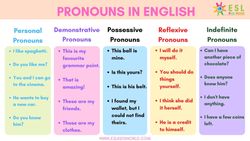
Complete each sentence with an appropriate pronoun to go with each antecedent.
1. Kim and Emily went bowling. Though Kim likes bowling, __________ isn't very good at it.
2. This car is really nice. How much was __________?
3. If there are more, I might like to have some of __________.
4. Laura called to ask for a favor, and I told __________ I would do __________.
5. Don't be late for that call with our teachers. __________ is important.
6. Everyone enjoyed the party. __________ are all talking about __________.
7. You should feed your frog, but not the turtles. __________ looks hungry.
8. That man always speaks about things at length. I spend a lot of time listening to __________.
9. Today the sun is shining, and the birds are singing. __________ is a lovely morning.
10. Toby the puppy is sleeping now. __________ has had a busy morning.
Rewrite the second sentence in each pair, replacing the antecedent(s) with a pronoun.
1. Katie is a great student. Katie studies every day.
2. My dog, Toby, is so energetic. Toby keeps me running around all day.
3. This chair and that table are being thrown out. This chair and that table are old.
4. I got Dylan a craft cart for his birthday. Dylan really likes the craft cart.
5. These stories are very interesting. These stories are also exciting.
6. Paul gets a lot of emails. Paul can't read all of the emails.
7. Did you hear that noise? What was that noise?
1. Jill loves her dogs. (She/They) takes (it/them) everywhere.
2. Ian eats two vegetables. (They/He) ate one of (it/them) today.
3. Mary trains dogs. (She/they) is very patient and kind.
4. My parents' car isn't working. (She/They) have to fix (them/it).
5. Chris and the others come home today. I can't wait to see (him/them).
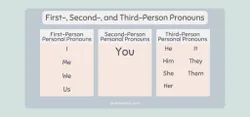
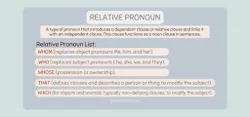
The commonly repeated advice for remembering whether to use who or whom is this: If you can replace the word with he or she or another subject pronoun, use who. If you can replace it with him or her (or another object pronoun), use whom. One way to remember this trick is that both him and whom end with the letter m.
The Rule: Who functions as a subject, while whom functions as an object. Use who when the word is performing the action. Use whom when it is receiving the action. Kim is an athlete who enjoys distance running.
1. ________ did you see there? (who/whom)
2. They wished to avenge ________, on their enemy. (themselves/their selves)
3. _______ do you trust the most? (who/whom)
4. The two brothers help __________ in their business. (each other/one another)
5. Time and tide will wait for ________. (no man/none)
1. I know the person ______ you suspect. (who/whom)
2. ____ being a naughty girl, was often whipped by my mother. (I/me)
3. ________ of my friends gave me a present. (each / every)
4. Where is the person ________ you wanted to see. (which/whom)
5. Her house is situated opposite to _______. (me/mine)
Personal pronouns – The pronouns that are usually used as a subject of a sentence. These are usually associated as person, thing, or group; however, you have to distinguish whether it is used as singular or plural. Personal pronouns are as follows: I, we, you, he, she, it, and they.
Objective pronouns – These pronouns are used as a grammatical object. They can be the object of preposition, verb or infinitive phrase. These are: me, us, you, him, her, it, and them.
Possessive pronouns – These pronouns demonstrate ownership. Examples are as follows: mine, ours, yours, his, hers, its, and theirs.
Demonstrative pronouns – These pronouns are used to identify and point to the noun or pronoun. These are as follows: this, that, these, and those.
Interrogative pronouns – These are the pronouns that are used when asking a question. Here are examples: who, whom, what, which whoever, whomever, whatever, and whichever
Relative pronouns – These are used to link clauses or phrases to the rest of the sentence. These refer to nouns mentioned previously, acting to introduce an adjective (relative) clause. This could be: who, whoever, whom, whomever, that, which, and whichever.
Intensive pronouns – Visibly they are the pronouns ending with –self or –selves and are used to emphasize and intensify the word it is referring to. Examples are: myself, yourself, himself, herself, itself, ourselves, yourselves, and themselves.
Reflexive pronouns – Similar to an intensive pronoun, these pronouns end with –self or –selves and refer back to the subject of a clause or sentence. These pronouns are usually preceded by the adverb, adjective, pronoun, or noun. These are: myself, yourself, himself, herself, itself, ourselves, yourselves, and themselves.
Indefinite pronouns – These pronouns refer to one or more unspecified objects, beings, or places. Meaning they refer to not specific antecedent and refer to all, some, or none. There are quite a few of these pronouns, and a few examples are: one, few, any, nobody, anything, neither, either, nothing, anyone, everything, several, few, both and so on.
1. Only ______who are intelligent, will pass the test. (they/those)
2. One should not waste ______ time in idle talks. (his / one’s)
3. This is their house and the one at the end of the street is also ______. (their/theirs)
4. His appointment is in the morning; _______ is in the evening. (her/hers)
5. There is no one but _____. (I/me)
1. He is not more industrious than ______. (me/I am)
2. Your met _______ of those three friends. (neither / none)
3. He was displeased at _____ going there. (my/me)
4. I am one of those who cannot describe what ____ do not see. (I/they)
5. I think you should stay faithful to the person whom you are married / the person you are married to.
Personal pronouns
Personal pronouns refer to a specific person or thing.
Possessive personal pronouns are pronouns that show possession. They define a person (or a number of people) who owns a particular object.
Demonstrative pronouns
Demonstrative pronouns point to and identify a noun or a pronoun.
This and these refer to things that are nearby in space or time, while that and those refer to things that are farther away in space or further away in time.
Interrogative pronouns
Interrogative pronouns are used to ask questions. The interrogative pronouns are who, whom, which, and what.
Relative pronouns
Relative pronouns are used to link one phrase or clause to another phrase or clause. The relative pronouns are who, whom, that, and which. The compounds whoever, whomever, and whichever are also commonly used relative pronouns.
Indefinite pronouns
Indefinite pronouns refer to an identifiable, but not specified, person or thing. An indefinite pronoun conveys the idea of all, any, none, or some.
Reflexive pronouns
Reflexive pronouns refer back to the subject of the clause or sentence. The reflexive pronouns used in writing English are myself, yourself, herself, himself, itself, ourselves, yourselves, and themselves.
Intensive pronouns
Intensive pronouns add emphasize. They're the same pronouns as reflexive pronouns. For example, 'I did it myself.'
There are 12 personal pronouns for a person or group, and they are: I, you, he, she, it, we, they, me, him, her, us and them.
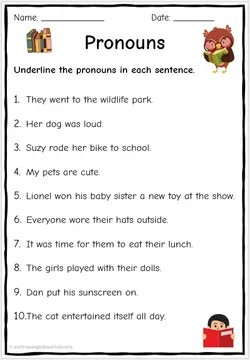
Write the correct possessive pronoun.
1. Did you finish ________ homework?
2. Eduardo is looking for ________ backpack.
3. I thought this was ________ car, but Sara told me that it was ________ car.
4. The TV has a scratch on ________ screen
.5. The neighbors put up ________ Christmas lights early this year
.6. ________ family values honesty and kindness.
7. Shauna and ________ boyfriend are going to the dance together
.8. ________ mom always told me to believe in myself
.9. Have you bought Harrison a gift for ________ birthday?
10. The mama cat takes good care of ________ kittens
Write the independent possessive pronoun.
1. You can order whatever you want. The choice is ________
.2. All my friends like to cook. Cooking is a favorite activity of ________.
3. My brother and I bought a car together to share, so it is ________.
4. The candy belongs to Sarah. It is ________.
5. I bought the food, so it’s _
By undefined
20 notes ・ 5 views
English
Elementary